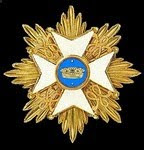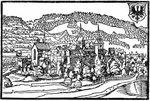And here at last are the strikingly different flags of IR 19 Markgraf Karl:
First raised 1702. During the Seven Years War the chef was Colonel Karl Friedrich Albrecht, Margrave of Brandenburg-Schwedt 1705-1762 (who passed on his dissolute ways to von Seydlitz, the famous cavalry commander, who was his page; von Seydlitz was with the Margrave from the ages of 14 to 19, and there acquired a passion for tobacco, womanising and crazy feats of horsemanship (Duffy, Army of Frederick the Great, 2nd Edition)). The Margrave was also Master of the Knights of St John 1731-62, as his father had been before him, and this was reflected in the unusual flags with their Maltese cross design; that cross was also shown on their grenadier caps and drums. After the death of the Margrave from wounds in June 1762 the flag design changed to a more traditional Prussian design.
In 1756 it was with the force that encircled the Saxons in Pirna. At Prague May 6th 1757 it had the good fortune to be in the second line of the attack and suffered light casualties. At Rossbach on 5th November it had no losses at all, apparently. By contrast, at Leuthen on December 5th the regiment attacked the churchyard and was "under small arms fire from beginning to end and almost completely ruined". Having participated in the siege of Breslau, which fell on December 19th, the King said the regiment had "worked wonders" but gave no awards. (Frederick was a hard man to please...) In 1758, after serving at the capture of Schweidnitz and the siege of Olmutz, it finally rejoined the King's forces in September. The entire regiment was badly clobbered in the surprise Austrian night attack on the Prussian camp at Hochkirch on October 14th. The grenadiers lost 209 dead and 50 prisoners defending the battery at Rodewitz; the 1st battalion defended the battery at the south-east corner of the town; and the 2nd battalion, under Major Simon Moritz von Langen, defended the churchyard. They held the churchyard for two hours before the remnants tried to break out of the back gate of the cemetery wall, using their bayonets as they had run out of ammunition. They were wiped out in the so-called Blutgasse outside the churchyard and von Langen died in Austrian captivity some days later from eleven bayonet wounds.
At Kunersdorf on 12th August 1759 the 1st battalion and grenadiers were in the advance guard and stormed the Russian batteries on the Spitzberg, losing 276 men; the 2nd battalion was on the right flank near the Kudenberg and lost heavily. Losses followed at Korbitz on September 21st. In 1760 it was at Strehla and Wittenberg, and at Torgau on November 3rd the 2nd battalion was with the Queiss Brigade under the King's command and the 1st with Zieten.
Christopher Duffy says that "after the Seven Years War Frederick failed to do justice to this remarkable regiment". He expressed dissatisfaction with its conduct at Kunersdorf as late as 1774, saying most of the regiment "did not want to behave properly in the field". In contradiction, he is also supposed to have said: "If I place myself at the head of my Markish troops, even if I have lost half my monarchy, as long as I still have my head, I'll drive the devil out of hell!".
And here is the musketeer uniform of IR 19 in the Seven Years War (note the zigzag orange line on the lace; tedious to represent but I had to try!):
(I have also now added uniform plates to the flags of IRs 1 Winterfeldt and 23 Forcade, below.)




















Sir David you have done a wonderful job on one of my favorite flags...Bill
ReplyDeleteStunning standards (and uniform)! Well done.
ReplyDeleteBest Regards,
Stokes
Thanks, Bill. Yes, it does seem to have come out pretty well, doesn't it? - pleasing considering the trouble I had with the first version!
ReplyDeleteAll the best,
David.
Thanks, Stokes. It will be good to see some of these Prussian flags appearing on people's wargame tables sometime!
ReplyDeleteI'm thinking about tackling IR 6 and IR 15 as part of this project - a lot more work involved, as they do not use the standard Prussian flag design elements, on the whole.
All the best,
David.
That's a fine piece of work. Don't think I've ever seen this one before?
ReplyDeleteThanks, Ray. It's certainly an unusual Prussian flag, and an interesting regiment too. I rarely find so much to say about a unit!
ReplyDeleteCheers,
David.
Thanks for the info on the Prussian Regt. IR19. This is just the inspiration I was looking for. I have recently bought a Bde of Minden Prussian Line Inf from Jim Purkey for my fictitious Electoral Army and want Prussian Regt to support it.
ReplyDeleteThe significance of this to me is that I hold the Service Medal of the Order of St John with 4 bars, denoting over 45 years of voluntary service. I rose to be Deputy Area Nursing Officer for Nottingham.
The two mottoes of the Order are "Pro fide (for the faith) and Pro Utilitate Hominum (for the service of mankind) denoting both the military and religious foundation of the Order dating from the first Crusade. Thanks once again, Ken
Thanks, Ken. I'm glad the flags and their history have been inspiring! And congratulations on, and thanks for, so many years of voluntary service for a very good cause.
ReplyDeleteThose Minden figures are very attractive. If you use my flags with them please do let me have pictures of them in action. Thanks!
All the best,
David.
Thanks for that David.
ReplyDeletePlease explain
how I obtain this flag.
Many thanks,
Ken
Hi Ken,
ReplyDeleteYou should be able to click on the flag image which will enlarge it and then right click Save Image As to save it to you computer. You can then print the flag sheet at any size you wish from your computer. If you still have problems, let me know and I can email the flags to you.
Cheers,
David.